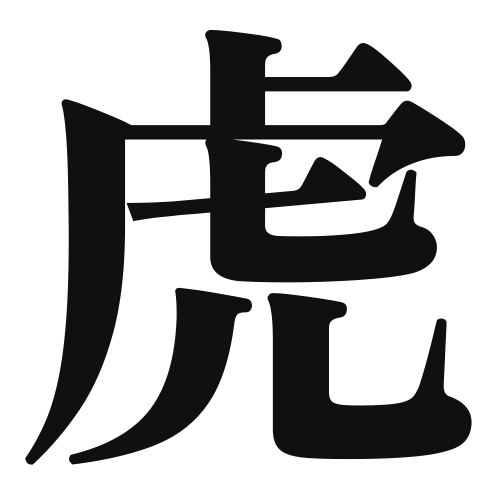1. Overview of Meaning
The kanji “虎” (pronounced “tora” in Japanese) means “tiger.” It represents the majestic and powerful big cat known for its strength and agility. In various cultures, the tiger symbolizes courage, strength, and protection.
2. Formation and Radicals
Formation of the Kanji: The kanji “虎” is a pictogram that visually represents a tiger. It is classified as a pictographic character, as it resembles the animal itself.
Radical: The radical for “虎” is also “虎,” which is used in other kanji related to tigers or similar animals.
3. Examples of Usage
Common Words and Phrases:
- 虎 (tora) – tiger
- 虎視眈々 (koshitantan) – to watch closely, to be on the lookout
Example Sentences in Daily Conversation:
- 「動物園で虎を見ました。」(Dōbutsuen de tora o mimashita.) – “I saw a tiger at the zoo.”
- 「彼は虎のように勇敢です。」(Kare wa tora no yō ni yūkan desu.) – “He is brave like a tiger.”
4. Synonyms and Antonyms
Similar Kanji:
- 獅子 (shishi) – lion: While both are big cats, the lion is often associated with pride and social behavior, whereas the tiger is seen as a solitary and powerful hunter.
Antonyms:
- 羊 (hitsuji) – sheep: The sheep symbolizes gentleness and meekness, contrasting with the tiger’s strength and ferocity.
5. Cultural and Historical Background
Relation to Japanese Culture: In Japan, the tiger is often associated with strength and protection. It is one of the twelve animals of the Chinese zodiac, representing the year of the tiger.
Proverbs and Idioms:
- 虎穴に入らずんば虎子を得ず (Koketsu ni irazunba koji o ezu) – “You cannot catch a tiger cub without entering the tiger’s den.” This proverb means that one must take risks to achieve something valuable.
